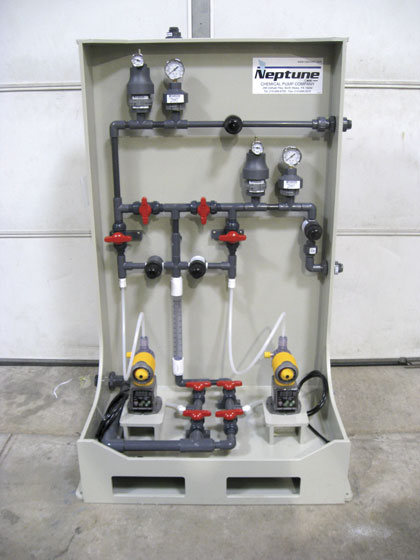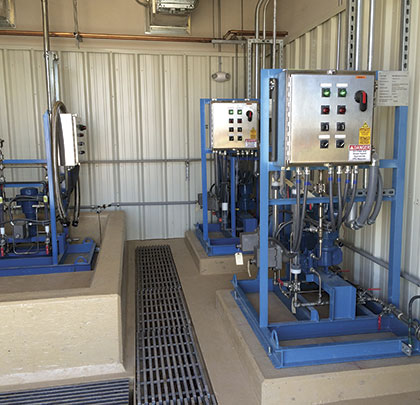At first glance, the treatment of municipal wastewater seems pretty straightforward—water that has been fouled flows into the wastewater-treatment facility, makes its way through the treatment system where any harmful impurities or particulates are removed, and once it has reached a predetermined level of cleanliness, is either released to the environment, i.e. a local stream or pond, or sent out for reuse.
In reality, however, treating wastewater is a highly complicated process featuring any number of critical steps that must be performed to exacting criteria by highly technical pieces of equipment. The system is also only effective when the proper chemicals are used to treat the water, and these chemicals can cover a wide range in terms of pH level, viscosity, material compatibility and handling characteristics.
A few of the more commonly used chemicals in wastewater-treatment applications, and their characteristics, include:
SODIUM HYPOCHLORITE
Known throughout the world as bleach, this liquid is most commonly used for disinfection at the treatment plant. It is one of the most difficult chemicals to handle as most metals will corrode when coming into contact with it, and it cannot be mixed or stored with ammonia and other acids, organics and reducing agents that might be used at the plant. It’s also difficult for metering pumps because of its tendency to off gas, which can cause metering pumps to become gas bound. Special vent valves are available for diaphragm pumps to prevent this from occurring. Also, peristaltic pumps can be used, which does not allow this phenomenon to occur.
SULFURIC ACID
Used for pH adjustment, it is provided either as a concentrate or dilute with concentrated solutions being less corrosive than dilute solutions. Concentrated solutions can be handled in many situations with cast iron, steel materials or Alloy 20 while dilute solutions require plastics such as PVC or Kynar®.
SODIUM HYDROXIDE
Used for pH adjustment, it is often provided in solution strengths from 25 percent to 50 percent. Special care is required for metering-pump elastomers, such as Viton® (often a material used for O-ring seals within a metering pump), which is not compatible. Also, especially when provided in higher solution strengths, this chemical has a tendency to gel in the pump if the pump is idle for a period of time. Flush valves or special pump heads can assist with this issue.

SODIUM BISULFITE
One of the most commonly used dechlorinating agents at treatment plants. A mixer is commonly required to keep this chemical in solution in the metering-pump supply tank. Both plastics such as PVC and Kynar, as well as metals such as 316 stainless steel are suitable materials for this chemical.
EMULSION POLYMER
Fed as a coagulant to assist the dewatering equipment within a wastewater treatment facility, this chemical is often extremely viscous and is shear-sensitive, once hydrated. Diaphragm pumps with high-viscosity head designs or peristaltic pumps are often required.
A LOOK AHEAD
Faced with the myriad chemicals that can be used in wastewater-treatment systems, and knowing that each one contains unique handling and implementation characteristics that must be followed to the letter, plant operators must be certain that they have selected the proper metering pump technology for their dosing applications.
With that in mind, they must be made aware that there is no “one size fits all” solution to the metering pump selection. In fact, creating the most efficient, effective and—most importantly—safe chemical-handling operations in wastewater treatment will most likely require the use of different types of pump technologies, all of which bring their own set of benefits to the operation. In next month’s conclusion, we’ll take a closer look at four pump technologies that can play a key role in an optimized wastewater-treatment operation if implemented properly.
About The Author
Tom O’Donnell is director of business development for Neptune™ Chemical Pump Company and PSG®. He can be reached at 215.699.8700, ext. 3327 or tom.odonnell@psgdover.com. Based in North Wales, Pennsylvania, Neptune is a leading manufacturer of chemical metering and peristaltic (hose) pumps, chemical feed systems, chemical injection accessories, make-down systems and industrial mixers. Neptune is a product brand of PSG®, a Dover company, Oakbrook Terrace, Illinois. PSG is comprised of several of the world’s leading pump companies, including Abaque®, Almatec®, Blackmer®, Ebsray®, EnviroGear®, Griswold™, Mouvex®, Neptune™, Quattroflow™, RedScrew™, and Wilden®. For more information, visit www.neptune1.com and www.psgdover.com.
____________________________________________
MODERN PUMPING TODAY, May 2017
Did you enjoy this article?
Subscribe to the FREE Digital Edition of Modern Pumping Today Magazine!



